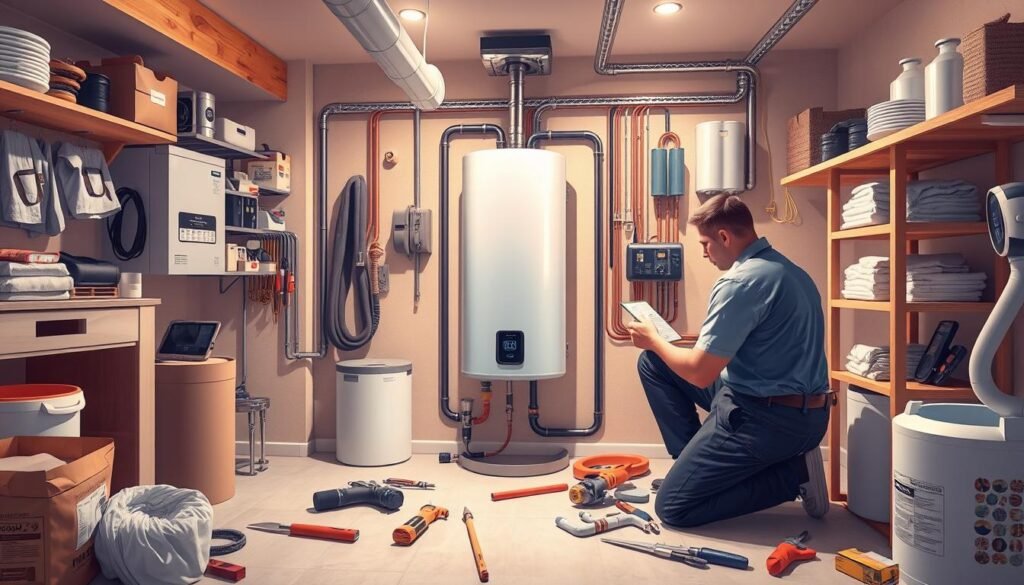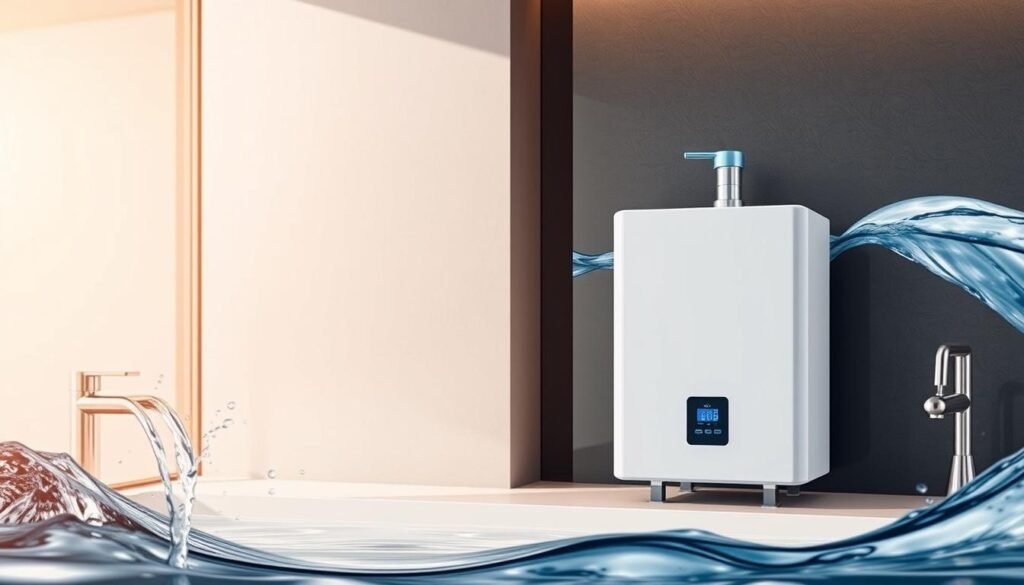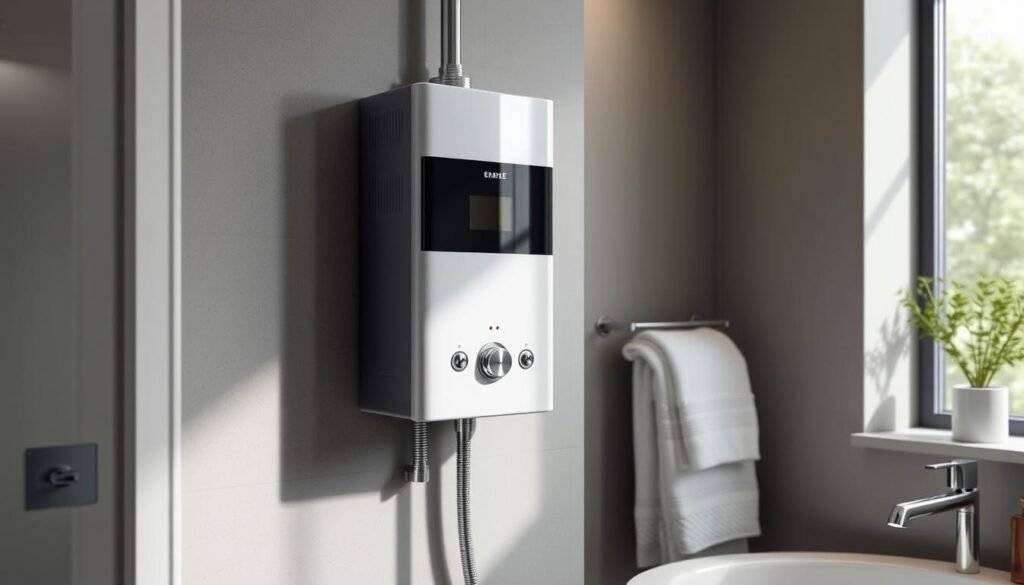Homeowners are always looking for ways to save energy and money. Tankless electric water heaters offer a smart solution to these concerns. These innovative devices provide efficient, compact, and eco-friendly home heating.
They deliver hot water on demand, reducing energy waste. This technology revolutionizes how we heat water in our homes.
Table of Contents
ToggleKey Takeaways
- Tankless electric water heaters provide hot water on-demand, eliminating standby energy losses associated with traditional tank-style heaters.
- These energy-efficient units can save homeowners up to 34% on their hot water energy costs, depending on usage patterns.
- Tankless electric water heaters have a longer lifespan of over 20 years, compared to 10-15 years for traditional storage tanks.
- Their compact, space-saving design makes them ideal for homes with limited space.
- Tankless electric water heaters offer a continuous supply of hot water, ensuring you never run out.
What is a Tankless Electric Water Heater?
Tankless electric water heaters are a game-changer in home water heating. They heat water instantly, on-demand, unlike traditional storage-tank heaters. These compact units use a heat exchanger to warm water rapidly when you turn on a faucet.
This electric tankless technology provides endless hot water. You’ll never run out of hot water, a common issue with tank-style heaters.
How Tankless Water Heaters Work
Tankless electric water heaters have a simple, effective heating system. A sensor activates the electric heating element when water flows through the unit. This instantaneous water heating process delivers hot water at 2-5 gallons per minute.
Tankless heaters are great as point-of-use water heater solutions for homes and apartments. They heat water only when needed, making them more energy-efficient than traditional tank models.
- Compact, space-saving design
- Continuous, on-demand hot water supply
- Increased energy efficiency and cost savings
- Longer lifespan than tank-style water heaters
Tankless electric water heaters offer a modern solution for residential water heating. They provide reliable, efficient, and convenient hot water for homeowners’ needs.
Advantages of Tankless Electric Water Heaters
Tankless electric water heaters beat traditional storage tank models in many ways. They’re super energy efficient, saving up to 34% on energy bills for low-use homes. Even high-use households can enjoy 8-14% energy savings.
These heaters are tiny, taking up 90% less space than bulky tank units. This makes them perfect for small homes. Plus, they provide endless hot water on demand.
Tankless heaters are great for the environment too. They don’t waste energy like storage heaters do when sitting idle.
- Up to 34% more energy-efficient for homes using 41 gallons or less of hot water per day
- 8-14% more efficient for homes using around 86 gallons per day
- 90% smaller and more compact design than traditional storage tank heaters
- Endless supply of hot water, heating it on-demand
- Eco-friendly, as they do not produce standby energy losses associated with storage water heaters
Tankless electric water heaters save energy and space. They’re also eco-friendly, making them a top choice for green-minded homeowners.
| Benefit | Description |
|---|---|
| Energy Efficiency | Tankless water heaters can be up to 34% more energy-efficient than conventional storage tank models, leading to significant cost savings on utility bills. |
| Compact Design | Tankless water heaters take up 90% less space than traditional storage tank models, making them an ideal choice for homes with limited space. |
| Endless Hot Water | Tankless water heaters heat water on-demand, providing an endless supply of hot water without the limitations of a storage tank. |
| Eco-Friendly | Tankless water heaters do not produce standby energy losses associated with storage water heaters, making them a more sustainable choice. |
“Tankless water heaters can last up to two times as long as traditional tank water heaters.”
Energy Efficiency and Cost Savings
Reducing Utility Bills
Tankless electric water heaters boast impressive thermal efficiency ratings of up to 99%. This means they convert almost all electricity into usable heat. As a result, they offer significant energy efficiency of tankless water heaters and substantial utility bill savings.
The U.S. Department of Energy reports impressive statistics for homes using 41 gallons or less of hot water daily. In these cases, tankless water heaters can be 24%-34% more energy efficient than conventional models. This efficiency can lead to up to 50% savings on water heating costs.
Homeowners can save between $44 and $108 annually with a tankless water heater. These efficient devices typically last over 20 years, outlasting traditional models by 5-10 years. This longevity adds to their appeal as a smart investment for improved thermal efficiency.
“Switching to a tankless water heater can lead to an average annual savings of $108 for gas-fired water heaters and $44 for electric water heaters.”
Compact and Space-Saving Design
Compact tankless water heater design revolutionizes home heating efficiency. Tankless electric water heaters are up to 90% smaller than traditional storage tanks. This space-saving feature allows for point-of-use water heating with a reduced footprint.
These small tankless models fit in tight spaces like closets or under sinks. They can even be mounted on walls, freeing up valuable floor space. This design maximizes usable square footage in homes and apartments.
The compact size also means hot water travels less distance. This improves efficiency and delivers hot water faster to where you need it.
- Up to 90% more compact than traditional storage tank water heaters
- Ideal for homes, apartments, and commercial spaces with limited space
- Flexible installation options, including under sinks or on walls
- Reduced hot water travel distance for improved efficiency and faster delivery
Compact tankless water heater design offers a smart solution for hot water needs. It’s efficient and practical, preserving your living or working space.
Endless Hot Water Supply
Tankless electric water heaters offer an endless supply of instant hot water. Unlike tank-style heaters, they heat water on-demand. This ensures continuous hot water, even during peak usage times.
These heaters typically deliver hot water at 2-5 gallons per minute. They’re great for homes with multiple hot water needs. The on-demand heating means no waiting for a storage tank to reheat.
| Household Appliance | Typical Flow Rate (GPM) |
|---|---|
| Water-Saver Shower Head | 1.5 GPM |
| Standard Shower Head | 2.0 GPM |
| Standard Hand Sink | 0.5 GPM |
| Kitchen Sink | 1-2 GPM |
| Bath Tub | 4 GPM |
| Dishwasher | 1-2 GPM |
| Washing Machine | 1-1.5 GPM |
Tankless electric water heaters meet modern household demands efficiently. They provide a convenient solution for endless hot water supply. You’ll always have hot water when you need it.
tankless electric water heater Installation and Maintenance
Professional Installation
Installing a tankless electric water heater properly is vital for optimal performance. A qualified plumber should handle the job to ensure safety and efficiency. Proper installation considers fuel type, climate, and local building codes.
Manufacturers provide detailed installation guides. It’s crucial to obtain necessary permits and meet local regulations. Professional installation prevents issues like improper venting or inadequate electrical wiring.
- Ensure the installation meets local building codes and safety requirements
- Follow the manufacturer’s instructions carefully during the installation process
- Consult a professional if you lack the necessary skills or expertise
Regular maintenance extends the heater’s lifespan and maintains efficiency. This includes flushing the system and cleaning the heat exchanger. Professional installation and proper upkeep ensure long-lasting benefits.

“Proper tankless electric water heater installation is crucial for maximizing energy efficiency and performance.”
Environmental Impact and Sustainability
Tankless electric water heaters are eco-friendly and sustainable. They’re highly energy efficient, reducing electricity use and greenhouse gas emissions. This minimizes the carbon footprint associated with water heating.
Electric tankless heaters don’t burn fossil fuels. This makes them more environmentally beneficial than storage tank or gas-fired tankless models. As the grid shifts to renewable sources, their eco-friendliness increases.
Their compact design and on-demand heating also boost sustainability. These features make tankless electric heaters a smart choice for eco-conscious homeowners.
Reducing Carbon Footprint
Home heating uses about 17% of an average family’s energy. Americans spend $400-$600 yearly on water heating energy. Tankless heaters can be more efficient than tank-based systems.
They only heat water when needed. This reduces standby heat losses and saves energy. The result is a smaller carbon footprint for your home.
- Electric tankless heaters don’t produce direct greenhouse gas emissions, but emissions related to electricity generation depend on the power grid’s sources.
- Natural gas or propane tankless heaters emit greenhouse gases, but their overall emissions may be lower compared to tank-based heaters due to enhanced energy efficiency.
- Solar water heaters are highly energy-efficient, relying on solar energy with minimal direct greenhouse gas emissions.
- Heat pump water heaters can be two to three times more energy-efficient than traditional electric water heaters, with potential for additional energy savings when combined with renewable energy sources.
Water heating’s environmental impact links to its energy sources. Renewable sources are better than fossil fuels. They have lower greenhouse gas emissions and a smaller ecological footprint.
Choosing the Right Tankless Electric Water Heater
Size and Flow Rate Considerations
Selecting a tankless electric water heater requires careful thought about your home’s needs. Most residential models deliver 2-5 gallons per minute (GPM). Your household size and hot water usage determine the ideal flow rate.
Larger families or homes with high demand might need a higher flow rate. In some cases, installing multiple tankless units could be necessary. Matching the heater size to your usage ensures efficient performance.
In colder states like Minnesota, tankless heaters need high BTU ratings. This helps warm groundwater from 40°F to 120°F. Condensing models are 10% more efficient than non-condensing ones, saving energy.
Key factors to consider include flow rate requirements, sizing considerations, and matching water heating needs. These elements help you pick the best option for your home.

“Tankless water heaters can save money over time with energy efficiency and reduced maintenance and repair costs, potentially making them a more economical option for many homes.”
Tankless Electric Water Heaters and LEED Certification
Tankless electric water heaters are becoming a top choice for sustainable building. These compact systems boost energy efficiency in green building certification programs. The LEED program recognizes their value in environmentally-friendly construction.
LEED awards points for buildings using tankless electric water heaters. These systems heat water on demand with high efficiency. This feature helps buildings achieve LEED certification and reduce environmental impact.
LEED guidelines offer points for high-efficiency water heaters. Tankless electric models can earn up to 2 points. Energy Star certified heaters get 1 point. Heaters with higher thermal efficiency earn more points.
Intellihot commercial tankless water heaters earn 1.5 LEED points. Their Electron Series can earn 2 points in most areas. This series boasts a maximum COP of 4.9.
| LEED Certification Requirement | Points Earned |
|---|---|
| Energy Star certified water heater | 1 point |
| Water heater with thermal efficiency above 0.9 | 1.5 points |
| Water heater with thermal efficiency above 1.8 | 2 points |
| Intellihot commercial tankless water heaters | 1.5 points |
| Intellihot Electron Series (maximum COP of 4.9) | 2 points |
Using tankless electric water heaters helps builders meet LEED certification goals. This choice creates more energy-efficient and sustainable living spaces. It’s a smart move for environmentally-conscious construction projects.
“Tankless electric water heaters are a game-changer for green building initiatives, helping projects earn valuable LEED certification points and reduce their environmental impact.”
Improving Energy Efficiency with Tankless Electric Water Heaters
Tankless electric water heaters offer a smart solution for home water heating. They heat water on-demand, eliminating standby energy losses. This can lead to 50% savings on utility bills compared to traditional water heaters.
These heaters are compact and space-saving. They provide endless hot water, making them practical and sustainable. Homeowners can improve energy efficiency and reduce their carbon footprint with these devices.
Tankless electric water heaters contribute to green building. They offer sustainable water heating solutions, despite not being Energy Star approved yet.
The U.S. Department of Energy reports that water heating accounts for 18% of home energy use. It’s the second-largest energy consumer in households. New, efficient water heaters can cut annual heating costs by 10-50%.
Homeowners can boost energy efficiency further with these steps:
- Adjusting the water heater’s thermostat to 120 degrees Fahrenheit
- Insulating the water heater and hot water pipes to reduce heat loss
- Considering renewable options like solar water heaters or heat pump systems
The Inflation Reduction Act offers a 30% tax credit for heat pump or solar water heaters. This credit, available until 2032, covers up to $2,000 of purchase and installation costs.
Tankless electric water heaters and energy-saving measures can slash utility costs. They also help the environment through sustainable water heating. Homeowners can make a real difference by choosing these eco-friendly options.
Conclusion
Tankless electric water heaters are efficient and eco-friendly. They heat water on-demand, eliminating standby energy losses. This results in energy savings and lower utility bills.
Their compact, space-saving design suits various settings. They provide an endless hot water supply for homes and businesses.
These heaters contribute to green building and sustainability. They’re key to more energy-efficient home heating solutions.
Top brands like Navien, Takagi, Noritz, and Rinnai offer high-efficiency models. These cater to diverse needs of homeowners and businesses.
Tankless electric water heaters are a smart choice. They offer energy efficiency, compact design, and endless hot water. For sustainable, cost-effective water heating, they’re hard to beat.
FAQ
What is a tankless electric water heater?
Tankless electric water heaters heat water on demand without a storage tank. They use a heat exchanger and electric element to warm water as it flows through. This allows for a constant supply of hot water without waiting for a tank to fill up.
What are the key advantages of tankless electric water heaters?
Tankless electric water heaters offer several benefits. They are up to 34% more energy efficient than traditional models. Their compact design saves space. They provide endless hot water and operate in an eco-friendly manner.
How energy-efficient are tankless electric water heaters?
Tankless electric water heaters boast thermal efficiency ratings of up to 99%. For homes using 41 gallons or less of hot water daily, they can be 24%-34% more efficient. This leads to significant savings on utility bills.
How do the size and design of tankless electric water heaters compare to traditional storage tank models?
Tankless electric water heaters are about 90% smaller than traditional storage tank models. This compact design allows for easy installation in tight spaces or at the point-of-use.
Can tankless electric water heaters provide an endless supply of hot water?
Yes, tankless electric water heaters offer an endless supply of hot water. They heat water instantly as needed, ensuring continuous flow even during high demand periods.
What are the installation and maintenance requirements for tankless electric water heaters?
Proper installation by a qualified professional is crucial for tankless electric water heaters. Regular maintenance includes flushing the system and cleaning the heat exchanger. Manufacturers provide detailed manuals, and local regulations must be followed.
How do tankless electric water heaters contribute to sustainability and environmental impact?
Tankless electric water heaters are eco-friendly and sustainable. They reduce electricity consumption and minimize greenhouse gas emissions. Their compact design and on-demand heating also contribute to overall sustainability.
What factors should be considered when choosing a tankless electric water heater?
Consider your household’s size and flow rate requirements when choosing a tankless electric water heater. Larger homes may need a higher flow rate or multiple units. Match the heater’s size to your expected hot water usage for best performance.


